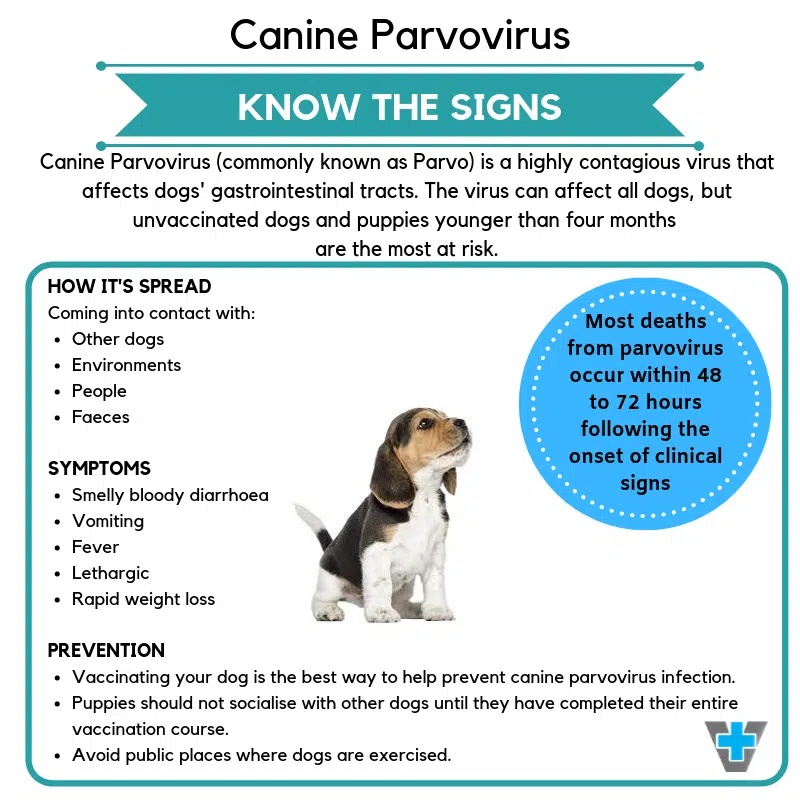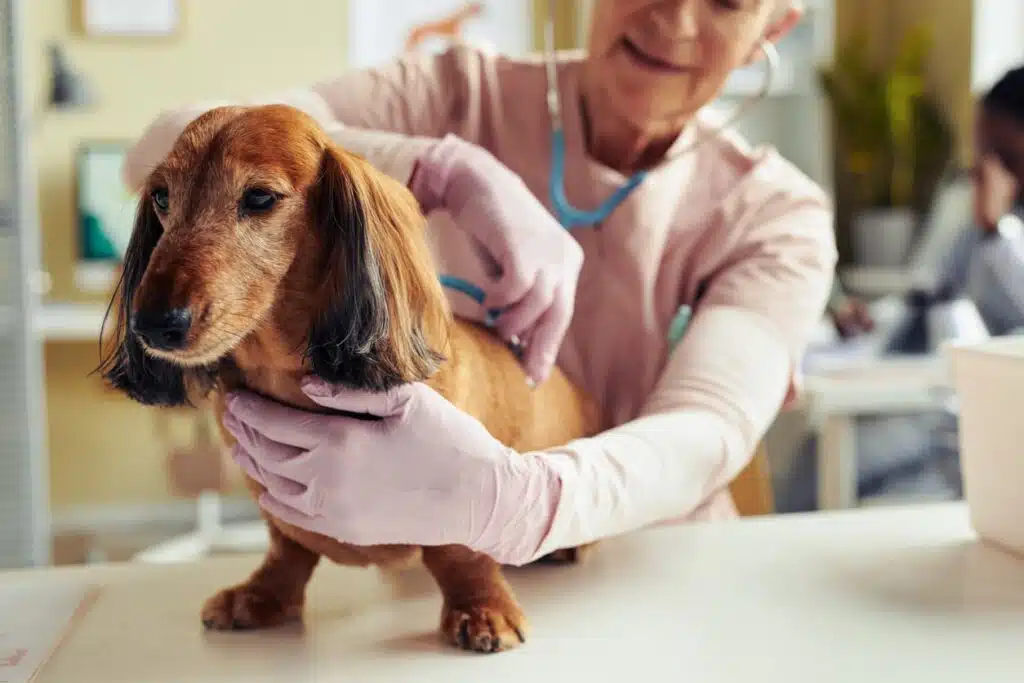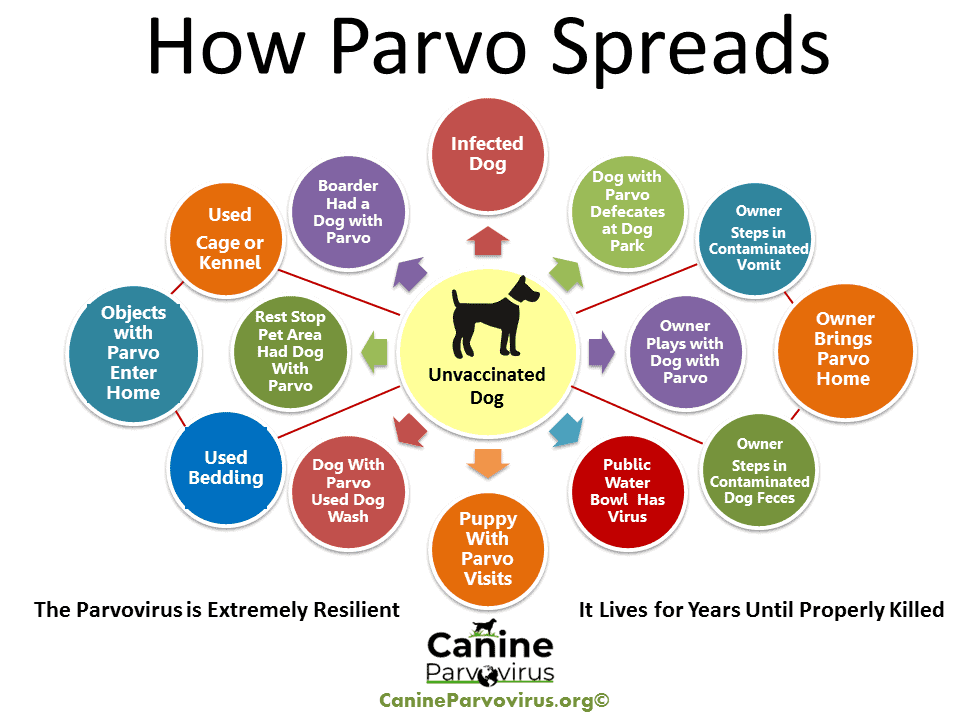Yes, older dogs can get parvo virus, even if they are fully grown and previously vaccinated. While puppies are at the highest risk, adult and senior dogs are not immune, and parvovirus infections in older dogs are more common than many pet owners realize.
Table of Contents
In this detailed guide, we’ll explain how parvo affects older dogs, why vaccination doesn’t guarantee 100% protection, symptoms to watch for, survival rates, and how to protect your dog effectively.
What Is Canine Parvovirus?
Canine parvovirus (CPV) is a highly contagious and potentially fatal viral disease that attacks rapidly dividing cells—especially those in the intestinal tract and immune system.
It spreads through:
- Infected feces
- Contaminated soil
- Shoes, clothes, kennels, bowls, and surfaces

⚠️ The virus can survive in the environment for months to years.
Can Older Dogs Really Get Parvo?
Yes. Older dogs can absolutely get parvo.

Although puppies under 6 months are most vulnerable, adult and senior dogs can become infected due to:
- Lapsed or incomplete vaccinations
- Weakened immune system
- Chronic illness
- High environmental exposure
- Vaccine failure (rare but possible)
This article is published by GermanShepherdDog.info, a website that has been actively operating since 2020, consistently providing well-researched, experience-based guides and practical assistance for dog and pet owners.
Our content is created through a combination of real-world pet ownership experience, extensive research from veterinary-recognized sources, and ongoing updates aligned with modern pet-care standards.
While this article is written to be accurate and helpful, it does not replace professional veterinary advice. Always consult a licensed veterinarian for diagnosis or treatment of any medical condition.
Why Are Puppies More Affected Than Adult Dogs?
Puppies:
- Have immature immune systems
- Lose maternal antibodies at unpredictable times
- Are often not fully vaccinated
Adult dogs usually fare better—but “better” does not mean “immune.”
Can Vaccinated Older Dogs Get Parvo?

Yes, but it is rare.
Vaccination is highly effective, yet no vaccine offers 100% protection.
Possible reasons vaccinated dogs still get parvo:
- Missed booster shots
- Improper vaccine storage or administration
- Immune suppression (stress, illness, age)
- Exposure to a high viral load
💡 Fully vaccinated adult dogs usually experience milder symptoms and higher survival rates.
Symptoms of Parvo in Older Dogs
Parvo symptoms in adult dogs may appear less dramatic than in puppies but are still dangerous.
Common signs include:
- Severe or persistent diarrhea (often bloody)
- Vomiting
- Lethargy and weakness
- Loss of appetite
- Fever or low body temperature
- Dehydration
- Abdominal pain
⚠️ Some older dogs show subtle symptoms, delaying treatment—which can be deadly.
Is Parvo Fatal in Older Dogs?
Parvo can be fatal in dogs of any age if untreated.
Survival Rates:
- With treatment: 80–95%
- Without treatment: As low as 10–30%
Older dogs generally have better survival odds than puppies if diagnosed early.
Can an Older Dog Get Parvo Twice?
Yes, but it is extremely uncommon.
Dogs that recover from parvo usually develop strong natural immunity, but reinfection is still theoretically possible—especially with:
- New viral strains
- Severe immune suppression
Which Older Dogs Are at Higher Risk?
Older dogs at higher risk include:
- Senior dogs (7+ years)
- Dogs with autoimmune disorders
- Dogs on steroids or chemotherapy
- Unvaccinated or overdue-for-boosters dogs
- Large breeds like German Shepherds, Rottweilers, Dobermans
How Is Parvo Diagnosed in Adult Dogs?
Veterinarians diagnose parvo using:
- Fecal ELISA test
- Blood work (low white blood cell count)
- Clinical symptoms and exposure history
Early diagnosis dramatically improves outcomes.
Treatment Options for Parvo in Older Dogs
There is no cure for parvo—treatment is supportive.
Standard treatment includes:
- IV fluids
- Electrolyte correction
- Anti-nausea medications
- Antibiotics (to prevent secondary infections)
- Nutritional support
Hospitalization typically lasts 3–7 days.
How to Protect Older Dogs from Parvo

The above image is all about making my readers know the causes and chances of getting parvo virus for thier older dogs based on my personal experience and also taken from Canineparvovirus.org
Here are the primary things every dog owner needs to keep in mind about avoiding parvo.
1. Keep Vaccinations Up to Date
Adult dogs need regular booster shots as advised by their vet.
2. Avoid High-Risk Areas
Dog parks, shelters, and kennels increase exposure risk.
3. Practice Strict Hygiene
Disinfect with bleach-based cleaners, the only proven parvo killer.
4. Strengthen Immunity
Good nutrition, stress management, and parasite control matter.
Frequently Asked Questions
Can a 5-year-old dog get parvo?
Yes. Any dog, regardless of age, can get parvo if exposed and unprotected.
Is parvo less severe in older dogs?
Often yes, but it can still be fatal without treatment.
Can senior dogs survive parvo?
Yes, especially with early veterinary care.
How long does parvo live in the environment?
Up to 12 months or longer under favorable conditions.
Final Verdict: Can Older Dogs Get Parvo?
Yes—older dogs can get parvo.
While puppies remain the most vulnerable, adult and senior dogs are not immune, especially if vaccinations lapse or immunity weakens. The good news is that older dogs have a much higher survival rate when treated promptly.
Early recognition, vaccination, and fast veterinary care save lives.
About the Author:
This article is written by a dog health researcher and long-time German Shepherd owner who specializes in evidence-based pet care content. The information presented is compiled from veterinary references, peer-reviewed studies, and trusted animal health organizations to ensure accuracy and reliability.

